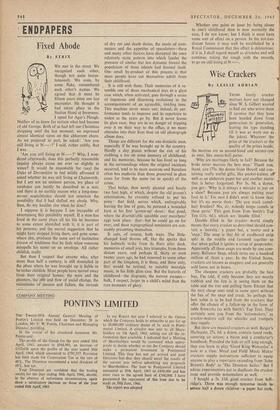ENDPAPERS
Fixed Abode
By STRIX
`Are you still living at N—?' Why, I won- dered afterwards, does this perfectly reasonable inquiry always cause me ever so slightly to wince?• It would be reasonable for (say) the Duke of Devonshire to feel mildly affronted if asked whether he was still living at Chatsworth; but I am not an eminent person, my place of residence can hardly be described as a seat, and there is no earthly reason why a long-time- no-see acquaintance should not entertain the possibility that I had shifted my abode. Why, then, do my hackles rise when he does?
I suppose it is because I am incapable of entertaining this possibility myself. If a man-has lived in the same place all his life he becomes to some extent identified with it, it is part of his persona; and the merest suggestion that he might riMie stopped living there, and gone some- where else, produces the same sort'of instinctive friss:on of tetchiness that he feels when someone misspells his name on an envelope. All rather childish, really.
But then I suspect that anyone who, after more than half a century, is still domiciled in the place where he was brought up is liable to be rather childish. Most people have moved away from their original homes; the wars and the planners, the ebb and flow of social change, the vicissitudes of success and failure, the inroads
of dry rot and death duties, the needs of com- muters and the appetites of speculators—these and many other factors have disrupted the once relatively static pattern into which ?under the pressure of similar but less dynamic forces) the population of these islands had formed itself. One small by-product of this process is that most people have cut themselves adrift from their childhood.
It is still with them. Their memories of it re- semble one of those mechanical toys in a glass case which, when activated, goes through a series of ingenious and disarming evolutions to the accompaniment of an agreeable, tinkling tune. This machine never wears out; indeed,' its per- formance tends to improve and its repertoire to widen as the years go by. But it never leaves its glass case; they are in no danger of tripping over it on their way to the office, it no more obtrudes into their lives than an old photograph album does.
Things are different for the one-domicile man, especially if he was brought up in the country. Hardly a day passes without the risk of his stubbing a toe on some memory of childhood; and his memories, because he has lived so long in the surroundings where the original incidents occurred, tend to be more accurate and therefore often less euphoric than those preserved in glass cases far from the scene (so to speak) of the crime.
That hedge, then newly planted and barely two foot high, at which, despite the old groom's exhortations, he cravenly refused to put his pony: that field, across which, unforgivably leaving the line of guns, he pursued a wounded hare at his first 'grown-up' shoot: that pond, where the discreditable squabble over moorhens' eggs took place: that—but he could go on for ever; and these topographical reminders are con- stantly presenting themselves.
It cuts, of course, both ways. The little- changed land throws off, like the sparks that his hobnails strike from its flints after dusk, memories of small joys, tiny triumphs, from those distant years; and perhaps if, thirty or even twenty years ago, he had removed to some other part of the kingdom, it is these, and these only, that would be revived, to suitably nostalgic music, in his little glass case. But the hazards of childhood—the disgraces, the narrow escapes— bulk, I suspect, larger in a child's mind than the rare moments of glory.
Whether one gains or loses by being closer to one's childhood than is now normally the case, I do not know; but 1 think it must have some sort of effect on a person. In the not-too- distant future it may well be established by a Royal Commission that this effect is deleterious; if it is, I shall regard myself as delendus and will continue, taking the rough with the smooth, to go on still living at N






























 Previous page
Previous page